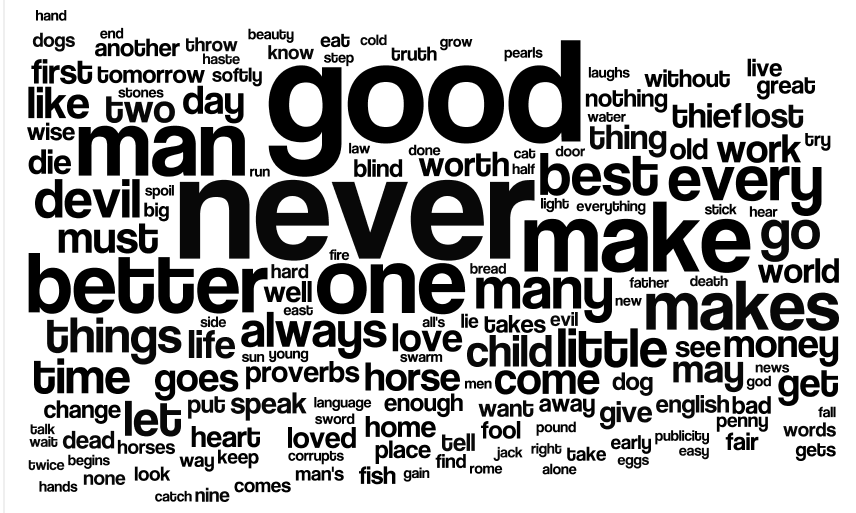A man who can turn his hand to many things.
Jack of all trades
What's the meaning of the phrase 'Jack of all trades'?
What's the origin of the phrase 'Jack of all trades'?
With any phrase that includes a name, it’s natural to consider whether its the name of a real person. In this case, as was the case with many other literary Jacks – Jack the Lad, Jack Robinson, Jack Sprat, Jack Horner, Jack Frost, etc, Jack of all trades was a generic term rather than a living and breathing individual. In fact, the very long list of terms that include ‘Jack’ exceeds that of any other name in English and this reflects the fact that, as a derivative of the common name ‘John’, ‘Jack’ has been used just to mean ‘the common man’. This usage dates back to the 14th century and an example is found in John Gower’s Middle English poem Confessio Amantis, 1390:
Therwhile he hath his fulle packe,
They seie, ‘A good felawe is Jacke’.
We now use ‘Jack of all trades, master of none’ in a derogatory way. Originally, this wasn’t the case and the label ‘Jack of all trades’ carried no negative connotation, the ‘master of none’ part being added later. Nevertheless, medieval Jacks were pretty much at the bottom of the social tree. The OED defines the generic meaning of the name Jack thusly:
Jack – A man of the common people; a lad, fellow, chap; especially a low-bred or ill-mannered fellow, a ‘knave’
If 16th century commentators wanted to imply that a person was stretching their talents too thinly they resorted to the disparaging Latin term Johannes factotum (‘Johnny do-it-all’). In 1592, the English writer and member of the literary establishment Robert Greene wrote a pamphlet titled Groats-worth of Witte. In that he ventured the opinion that a new writer on the scene was:
An upstart crow, beautified with our feathers, that supposes he is as well able to bumbast out a blanke verse as the best of you. Beeing an absolute Johannes fac totum, is in his owne conceit the onely Shake-scene in a countrey.
Sadly for Greene’s ongoing reputation the ‘Upstart crow’ was William Shakespeare.
Various trades were populated by Jacks – lumberjacks, steeplejacks for example, and sailors were Jack-tars.
For no especial reason, I’ve included a picture of three of my uncles who were steeplejacks. For the record, none of them was a Jack outside of work; they were Gilbert, Frank and Verdon.
The name Jack was also added to many utilitarian objects which in some way took the place of a lad or man, for example:
Smoke-jack (a roasting spit)
Jack-plane (a basic carpenter’s plane)
Jack-screw (a lifting winch)
Jack-frame (a carpenter’s sawing horse)
Boot-jack (for pulling off boots)
Jack-engine (a miner’s winch)
Jack-file (a coarse file)
There can’t have been any trades in the Middle Ages that didn’t make use of a jack of some sort. ‘Jack of all trades’ entered the language in 1612 when Geffray Minshull wrote of his experiences in prison in Essayes and characters of a prison and prisoners:
Some broken Cittizen, who hath plaid Jack of all trades.
The ‘master of none’ addition began to be added in the late 18th century. The headmaster of Charterhouse School, Martin Clifford, in a collection of notes on the poems of Dryden, circa 1677 wrote:
Your Writings are like a Jack of all Trades Shop, they have Variety, but nothing of value.
In 1770, the Gentleman’s Magazine offered the opinion that “Jack at all trades, is seldom good at any.”
The earliest example that I can find in print of the actual phrase ‘Jack of all trades, master of none’ is in Charles Lucas’s Pharmacomastix, 1785:
The very Druggist, who in all other nations in Europe is but Pharmacopola, a mere drug-merchant, is with us, not only a physician and chirurgeon, but also a Galenic and Chemic apothecary; a seller of druggs, medicines, vertices, oils, paints or colours poysons, &c. a Jack of all trades, and in truth, master of none.
Maybe taking on ‘all trades’ wasn’t wise but Jacks were often master craftsmen in their chosen trade. History books tell us that Cardinal Wolsey built Hampton Court Palace and that Charles Barry built the Houses of Parliament – don’t believe it, it was Jack.
See also: ‘Jack’ phrases and the List of Proverbs.
The history of “Jack of all trades” in printed materials
Trend of jack of all trades in printed material over time
Related phrases and meanings
Browse more Phrases
About the Author

Phrases & Meanings
A-Z
A B C D E F G H I J K L M N O P Q R S T UV W XYZ
Categories
American Animals Australian Bible Body Colour Conflict Death Devil Dogs Emotions Euphemism Family Fashion Food French Horses ‘Jack’ Luck Money Military Music Names Nature Nautical Numbers Politics Religion Shakespeare Stupidity Entertainment Weather Women Work
How did we do?
Have you spotted something that needs updated on this page? We review all feedback we receive to ensure that we provide the most accurate and up to date information on phrases.
